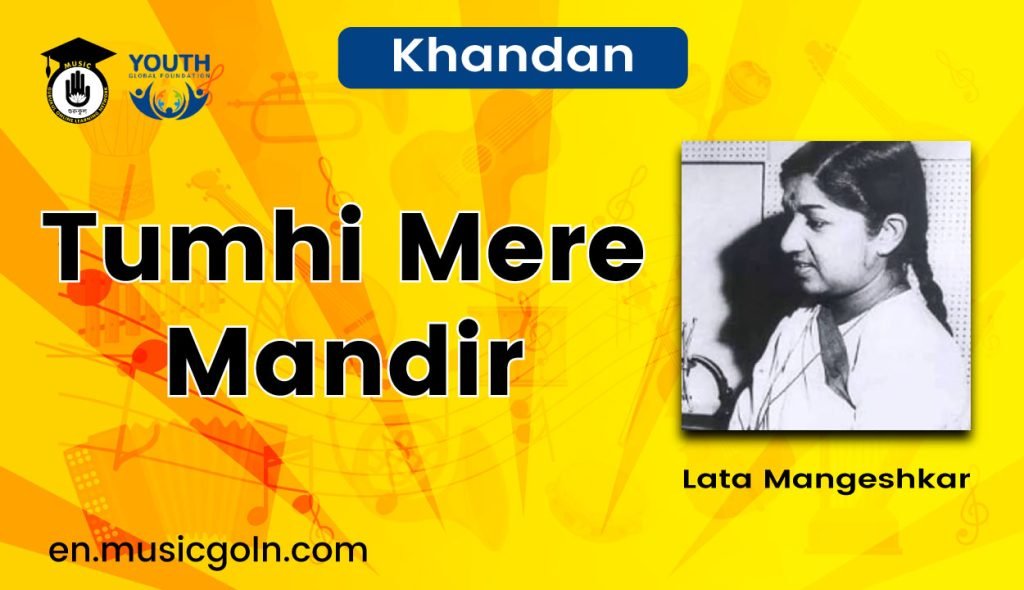Tumhi Mere Mandir Lyrics | Lata Mangeshkar | Khandan | 1965
Tumhi Mere Mandir Lyrics from Khandan is sung by Lata Mangeshkar. Tumhi Mere Mandir song lyrics are written by Rajinder Krishan while its music is given by Ravi.
Tumhi Mere Mandir Lyrics | Lata Mangeshkar | Khandan | 1965
Song : Tumhi Mere Mandir
Album : Khandan (1965)
Singer : Lata Mangeshkar
Musician : Ravi
Lyricist : Rajinder Krishan
Tumhi Mere Mandir Lyrics :
Tumhi mere mandir tumhi meri pooja
Tumhi devta ho, tumhi devta ho
Tumhi mere mandir tumhi meri pooja
Tumhi devta ho, tumhi devta ho
Koyi meri aankhon se dekhe to samjhe
Ke tum mere kya ho, ke tum mere kya ho
Tumhi mere mandir tumhi meri pooja
Tumhi devta ho, tumhi devta ho
Jidhar dekhti hoon udhar tum hi tum ho
Na jaane magar kin khayalon mein ghum ho
Jidhar dekhti hoon udhar tum hi tum ho
Na jaane magar kin khayalon mein ghum ho
Mujhe dekh kar tum zara muskura do
Nahi to main samjhungi mujhse khafa ho
Tumhi mere mandir tumhi meri pooja
Tumhi devta ho, tumhi devta ho
Tumhi mere maathe ki bindiya ki jhilmil
Tumhi mere hathon ke gajron ki manzil
Tumhi mere maathe ki bindiya ki jhilmil
Tumhi mere hathon ke gajron ki manzil
Main hoon ek chhoti si maati ki gudiya
Tumhi praan mere, tumhi aatma ho
Tumhi mere mandir tumhi meri pooja
Tumhi devta ho, tumhi devta ho
Bahut raat beeti chalo main sula doon
Pawan chhede sargam main lori suna doon
Bahut raat beeti chalo main sula doon
Pawan chhede sargam main lori suna doon
Tumhein dekh kar yeh khayal aa raha hai
Ki jaise farishta koyi so raha hai
Tumhi mere mandir tumhi meri pooja
Tumhi devta ho, tumhi devta ho
Tumhi mere mandir tumhi meri pooja
Tumhi devta ho, tumhi devta ho
Lata Mangeshkar (born as Hema Mangeshkar; 28 September 1929 – 6 February 2022) was an Indian playback singer and occasional music composer. She is widely considered to have been one of the greatest and most influential singers in India. Her contribution to the Indian music industry in a career spanning eight decades gained her honorific titles such as the “Queen of Melody”, “Nightingale of India”, and “Voice of the Millennium”.
Lata recorded songs in over thirty-six Indian languages and a few foreign languages, though primarily in Marathi, Hindi, and Bengali. Her foreign languages included English, Indonesian, Russian, Dutch, Nepali, and Swahili.She received several accolades and honors throughout her career. In 1989, the Dadasaheb Phalke Award was bestowed on her by the Government of India.
In 2001, in recognition of her contributions to the nation, she was awarded the Bharat Ratna, India’s highest civilian honour; she is only the second female singer, after M. S. Subbulakshmi, to receive this honour. France conferred on her its highest civilian award, Officer of the National Order of the Legion of Honour, in 2007.
She was the recipient of three National Film Awards, 15 Bengal Film Journalists’ Association Awards, four Filmfare Best Female Playback Awards, two Filmfare Special Awards, the Filmfare Lifetime Achievement Award and many more. In 1974, she was one of the first Indian playback singers to perform at the Royal Albert Hall in London, UK. Her last recorded song was “Saugandh Mujhe Is Mitti ki” released on 30 March 2019 as a tribute to the Indian Army and the Nation.
At one point, she appeared in the Guinness World Records, which listed her as the most recorded artist in history between 1948 and 1987. Mangeshkar was born on 28 September 1929: 67 in Indore (in the present-day Indore district of Madhya Pradesh), then the capital of the princely state of Indore which was part of the Central India Agency in British India.
Her father, Deenanath Mangeshkar was a Marathi and Konkani classical singer and theatre actor. Deenanath’s father was Ganesh Bhatt Navathe Hardikar (Abhisheki), a Karhade Brahmin.
who served as a priest at the famous Mangeshi Temple in Goa.Deenanath’s mother Yesubai Rane was his father’s mistress belonging to the Devadasi community of Goa,a matrilineal community of temple artists now known as Gomantak Maratha Samaj.As a Devadasi. Yesubai was a reputed musician. Deenanath’s father’s surname was Hardikar.: 47–48 Deenanath had taken the surname Mangeshkar, based on the name of his ancestral village, Mangeshi in Goa.
Read More :
- Paa Liya Hai Pyar Lyrics | Kyo Kii Main Jhuth Nahin Bolta | Alka Yagnik, Udit Narayan | 2001
- Tu Meri Dost Hain Lyrics | Benny Dayal, Shreya Ghoshal | 2008
- Choo Lo Lyrics | The Local Train | 2015
- Tum ek musafir ho lyrics | Phata Poster Nikla Hero | Atif Aslam & Chinmayi | 2013
- Saanson Ka Chalna Lyrics | Jeet | Alka Yagnik, Udit Narayan | 1996
- Agar Tum Na Hote Song Lyrics | Nihal Tauro | Himesh Reshammiya | 2021
